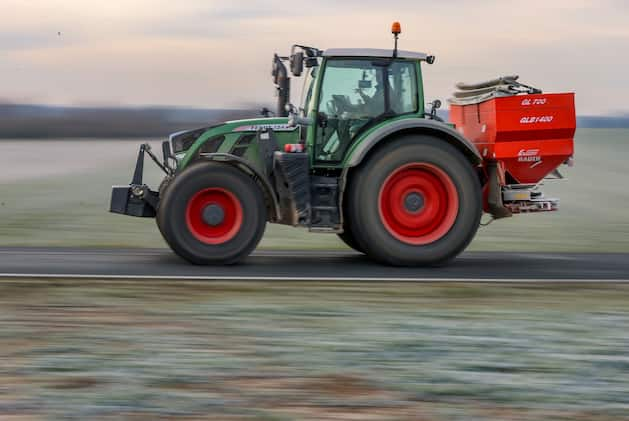Actually, 2023 should bring about a turning point in EU agricultural policy. Instead, the new year begins with a well-known discussion: how to pump even more money into the system, which is inscrutable to laypeople and traditionally draws considerable funds from the EU budget for its subsidies.
Janusz Wojciechowski is on a mission, whether in Brussels or Berlin. What the Polish EU Agriculture Commissioner had already left as a message in the European Parliament, he now also conveyed at the opening of the International Green Week: “We need a stronger budget than we have now, a budget that reflects the depth of our challenges and the level of our ambitions will do justice.”
The lows are the consequences of the Russian invasion of Ukraine, for EU farmers above all higher energy, fertilizer and feed costs. They are used to justify the continuing explosion in food prices – in November more than 18 percent on average in the EU, in Hungary even a dizzying 49 percent. The heights are more stringent requirements for environmental protection and species protection, as brought about by the latest reform of the “Common Agricultural Policy” (CAP) that has now come into force.
In part, EU organic regulations have already been temporarily suspended due to the special situation caused by Russian President Vladimir Putin’s campaign of extermination and its consequences for agricultural production. Now Wojciechowski adds: “We cannot ask the farmers to give more for less.” They are by no means filling their pockets, they are only passing on higher producer prices to consumers.
No one could have predicted the strain caused by the war in Ukraine when “the current budget saw the light of day with great pain,” emphasizes Wojciechowski. That is why the Commissioner wants to “lay the foundations for strengthening the CAP and for increasing the CAP budget”, as he announced before the European Parliament.
The chairman of the Parliament’s Agriculture Committee, CDU MP Norbert Lins, shows understanding for this in the FOCUS online interview: “I think it’s right that Commissioner Wojciechowski is now starting the debate about more support for our farmers from the EU budget has opened.
There will be no jubilation in the European Council, but there are also clear demands from the agriculture ministers that need to be addressed agriculture are planned. “You have to react to that.”
Farmers in the EU are dependent on EU subsidies to varying degrees, ranging from 20 to 70 percent of their income, according to Lins. The situation of farmers is also very different within Germany: “Higher prices can currently be achieved with milk and arable farming. However, the German fruit growers only have higher costs, no increased revenues. And the situation in pig farming is particularly dramatic.”
The agricultural expert of the Greens in the European Parliament, Martin Häusling, adds: “Large arable farms in eastern Germany are now earning really well, because grain prices have risen by 70 percent.” According to the green expert, organic farmers are relatively stable. The strong profits that the Corona crisis brought them have shrunk. “However, organic farming also has cost advantages. So it is not dependent on nitrogen fertilizers, the prices of which have risen sharply.”
In an interview with FOCUS online about the price development in Germany, Häusling also points out “that a lot has also got stuck in retail. Grocery discounters, for example, have increased the price of organic milk by 50 cents without any apparent reason or the producers benefiting from it. The general experience that everything is getting more expensive is used to get the right amount and go one better.”
According to MEP and co-leader of the German Left, Martin Schirdewan, 95 food and energy companies around the world more than doubled their profits last year. Schirdewan is demanding subsidies for consumers from the federal government: zero VAT on basic foodstuffs and a price brake on selected products in an “anti-inflation basket”: pasta, fruit, flour, bread, vegetables, milk, eggs, butter and oil.
According to unofficial calculations by the German Press Agency (dpa), the federal government transferred 25 billion euros net to Brussels last year as a national contribution to the EU budget. This year the total budget will be around 186 billion euros, from 2021 to 2027 a total of 1.074 trillion. According to the Commission, the agricultural funds provided for therein currently account for 0.4 percent of total European economic output.
The agricultural expert of the SPD in the European Parliament, Maria Noichl, doubts whether they are always used in a targeted manner. She told FOCUS online: “Crying for more and more fresh money is great in speeches in front of applauding farmers, but it doesn’t get us anywhere. A lot of money is already on the way in EU agricultural policy. But it is very much a question of whether it always gets to the right places and really has the effect that one hopes for.”
If you know which devices at home use how much electricity, you can make targeted savings. Our e-paper shows which devices use how much electricity for all common household appliances, from ovens and hobs to refrigerators and washing machines to TVs and WLAN routers. There are also a number of instant power-saving tips.
Noichl advocates more targeted support for those who are really in need, which she does not see sufficiently guaranteed in the new CAP. That’s why she demands: “We have to think about the next reform now.” The next EU Commission should quickly present plans for this after taking office. To pour out the big watering can on everyone again would be “not fair to our consumers”.
The Green Houseman also warns: “We mustn’t open the big pot now. Firstly, that would not be enforceable in the European Council and, secondly, it would also encourage other sectors to make representations about additional subsidies.” The CDU agricultural politician Lins believes, in his own words, “that consumers are helped above all by maintaining our production. Because the price increases are due to scarcity on the markets.”















